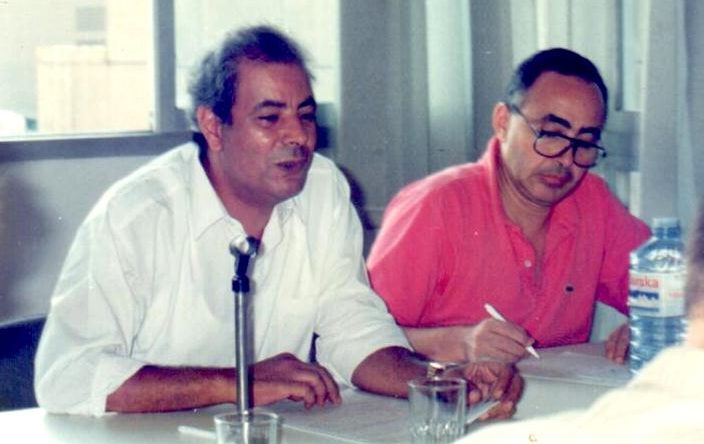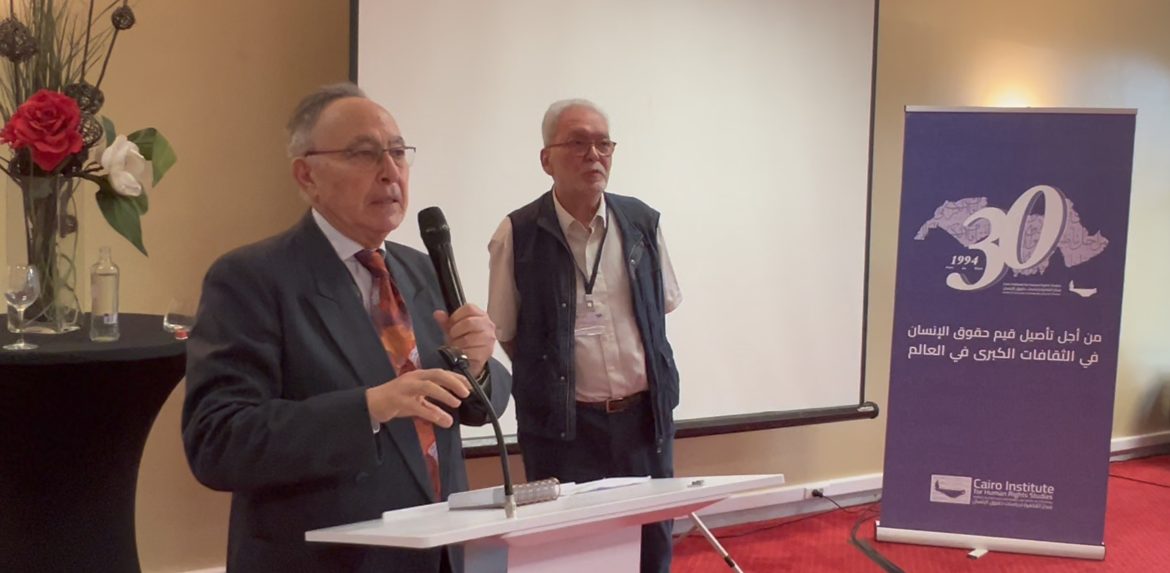In 2024, Cairo Institute for Human Rights Studies (CIHRS) celebrates 30 years of defending human rights in the Arab region, honoring the journey that began in Cairo on 14 April 1994. CIHRS pays homage to the late thinker Mohamed El-Sayed Said, the institute’s academic advisor and founder of its first intellectual building block, who remains present with his thoughts and intellectual legacy in CIHRS’ activities and events.
To commemorate its marking of three decades of human rights advocacy, CIHRS organized a reception in Brussels, Belgium on 13 April, parallel with the CIHRS’s 27th Regional Forum. The commemoration hosts a group of prominent human rights defenders from at least ten Arab countries, and a number of Arab academics and legal experts and others from Europe and the United States, alongside the editorial board of its peer-reviewed journal, Rowaq Arabi, and CIHRS Board of Directors, including its president Kamal Jendoubi from Tunisia and its general director Bahey eldin Hassan from Egypt. Jendoubi and Hassan exchanged words of welcome with the attendees and expressed gratitude for their participation in the momentous occasion. They reviewed the institute’s history; a journey of over three decades of work in a region raging with conflicts, where human rights work faces many restrictions and challenges.
Kamal Jendoubi began his speech by stating that CIHRS is an ‘idea’ based primarily on spreading the culture of human rights. This idea has developed and grown over the years in the form of training programs, conferences, forums and publications, and has coalesced over time with the advocacy and defense of human rights culture and values in regional and international forums. Jendoubi added that 30 years represents the prime of youth, and CIHRS thus has a journey to continue, another 30 years of work, under the helm of new human rights leaders and new mechanisms and tools.
Hassan dedicated the celebration and to the men and women working at CIHRS today; colleagues representing thirteen different nationalities and residing in ten countries around the world, with the work managed through four offices in four countries. Hassan expressed his gratitude and appreciation for their struggle and dedicated work, and further expressed his gratitude for CIHRS’ adherence, over its three decades of operation, to two fundamental values that have created a special status for the institute and distinguished its extended work. The first value is a deep belief the importance of integration between legal and academic work, reflected from the moment of CIHRS founding, in the joint work between Hassan and the academic Dr. Mohamed El-Sayed Said. This integration is still evident in all of CIHRS’ activities to this day, and in its publications and periodicals, which have a scholarly imprint and a clear academic presence. The second value is the belief, extended from the beginning, in the importance and feasibility of collective and complementary work with other human rights organizations. This value encompasses constant consulting with other organizations and rights defenders, expanding the circle of partners, allies and influencers, and building networks, alliances and working groups; all of which constitute the working method that CIHRS has followed, and continues to follow, in its work, especially in Egypt, Libya, Yemen, and Palestine.

From the left : Mohamed El-Sayed Said, Bahey eldin Hassan
The Cairo Institute for Human Rights Studies is an intellectual institution, aiming to encourage thought of entering into a new human civilization or a completely new era for human civilization, where humans return to occupying the central position in civilization, respecting the values of equality, freedom and justice, and believes in the dignity of humans by devoting and protecting freedom of conscience and belief, and the sanctity of body, mind and conscience. No living being may be tortured or arbitrarily detained, and that freedom of expression and assembly and the rights to health, education, food and work are promoted, and where it is affirmed that civil and political rights support economic, social and cultural rights, and vice versa.
CIHRS relocated from Cairo to Tunisia and has offices in three European countries: Switzerland, Belgium, and France. Jendoubi said CIHRS’ work abroad does not mean that its interest in the Arab region has declined, but rather, the institute’s presence in Europe has had a positive impact on the work in the region, according to new mechanisms and tools. Its European presence in addition to that in North Africa further grants CIHRS other opportunities for dialogue, work, and activities to advance human rights issues in the Arab region, focused on the institute’s work and mission.
The reception coincided with the 30th anniversary of CIHRS’ work, and further coincided with the 25th anniversary of the holding of the first regional forum organized by CIHRS in April 1999 in Casablanca, Morocco, in which numerous members of the current Board of Directors participated. The first forum was opened by the Moroccan Prime Minister at the time, Abderrahmane Youssoufi, who paid tribute to Bahey el-din Hassan, as well as to the soul of his ‘lifelong friend and companion,’ Mohamed El-Sayed Said.
In honor of Mohamed El-Sayed Said and lauding his inspiring lifelong struggle for human rights, CIHRS is proud to launch its project to collect his intellectual and journalistic legacy, digitally converting that which is not available online and making it available on the CIHRS website. In appreciation of his role not only in establishing CIHRS, but in the human rights movement in the Arab world as a whole.
Background information about CIHRS
Over three decades, CIHRS has enriched its human rights library with more than 400 issues, 70 print issues of the research journal Rowaq Arabi and thirteen online volumes, and nearly 100 issues of Sawasiya magazine, and twelve annual reports on monitoring and evaluating the human rights situation in the Arab region, with dozens of specialized qualitative online reports. CIHRS further held 22 summer schools for university students to teach human rights principles (about a thousand trainees), ten specialized regional courses on international mechanisms for defending human rights (more than 200 trainees), and three courses for new youth leaders of civil society, in addition to dozens of specific courses and programs, specialized courses for lawyers, journalists, teachers, artists, and researchers, and other courses concerned with the human rights movement in countries such as Libya, Syria, Iraq, and Sudan.
CIHRS has organized discussion sessions and debates over the years through the Ibn Rushd Salon, on the most prominent local and regional human rights issues. CIHRS has further organized dozens of international meetings, conferences, and regional forums, (27 forums), on various human rights issues of concern to the region as a whole. CIHRS continues to encourage and train emerging Arab human rights initiatives and form alliances and networks for joint work between them in several Arab countries. CIHRS is keen on boosting continuous networking with regional, international, UN and European mechanisms concerned with human rights. CIHRS has been honored with a special consultative status in the United Nations Economic and Social Council and with an observer status in the African Commission on Human and Peoples’ Rights. The institute was awarded with the French Republic Award for Human Rights in 2007, and the Martin Ennals Award for Human Rights Defenders, which was received by the director of its Egypt office in 2017.
Share this Post

